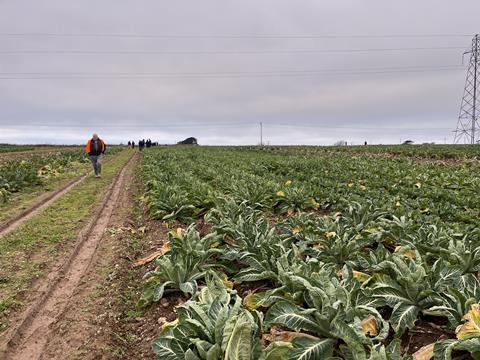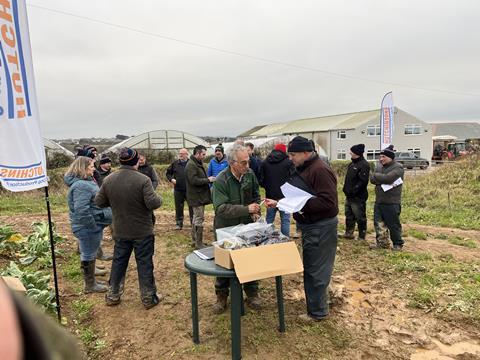Brassica growers, agronomists, packers and breeders head down to southwest UK for annual cauliflower trials that have been run by the Duchy College for 32 years

Around 70 growers, agronomists, packers and breeders turned out for the recent Duchy College Cornish autumn and winter cauliflower trials in Cornwall, UK, which offer an opportunity each year for brassica specialists to get together and assess the new varieties from all the major seed houses.
“We’re delighted to see so many attendees from all over the UK, Ireland and even France at this event,” said Sophie Rapson, trials manager at Duchy College, “and it shows how valuable these trials are to the future of the industry.”
“The value that local growers and those from further afield get from having the opportunity to view new cauliflower genetics alongside established varieties cannot be underestimated,” added Peter Waldock, technical support for vegetables at Hutchinson, a leading provider of agronomic advice and services. “Once again, the trials have helped bring the industry together, showcasing some excellent new performers for future cauliflower plantings.”
Assessing new varieties
A total of 73 varieties was on show, including autumn, winter and late winter varieties from nine UK and international seed houses.
“Two planting dates were trialled (16 and 24 July) at standard 36” x 21” spacing, with crops assessed for quality and yield as they reached maturity,” the company stated. “Despite a largely dull and wet season, apart from a drier period in August, most autumn varieties still yielded more than 70 per cent class 1 heads. The top performing autumn varieties were Twistique and Eldir, both yielding more than 90 per cent class 1 heads for first and second planting dates.”
“We try to ensure that both new introductions and older varieties are included in the trials here, so that we can see how consistent they perform over a period of three or more seasons,” said Rapson.
Winter varieties faced challenging conditions, she said, with warm, wet weather in November prompting rapid growth, followed by a slowdown the month after due to colder and drier conditions.
“This resulted in looseness and bracting in many varieties, and some yellowing in more open framed plants,” Hutchinson stated, adding that the top performers among the winter varieties had been E40W.822, Koten and Sassolungo.
Breeding insights
Following the field trials, delegates attended a conference in St Ives to hear updates on varieties and trial data from the seed houses. Breeders explained how new genetics from programmes based in the UK and Brittany would help growers improve uniformity, colouring and packed yields, with harvest windows from October through to May.
Sustainability was a key theme, with talks about the use of non-brassica cover crops and strip tillage. Dr Hannah Jones of Farm Carbon Toolkit discussed the Farm Net Zero project, including the use of a range of plant species intersown in a Savoy cabbage crop to reduce soil erosion losses and improve soil health.
There was also an update on crop protection product losses and new or imminent arrivals from Zander Foote of Allium and Brassica Agronomy.
Tim Lacey, Hutchinson’s fresh produce manager, presented some of the alternative approaches for growers looking to fill looming crop protection gaps, including the potential use of silicon compounds to strengthen plant defences against pests and entomopathogenic nematode use against a range of pests with soil-borne stages like slugs.
Tom Rowe, local area business manager and agronomist at Hutchinson, commented: “The outstanding turnout shows just how much the industry values the Cornish trials, the conference and, of course, the vital networking that happens along the way.”
“Thanks must go to the seed houses, local horticultural industry, Hutchinson and the Duchy College for continuing to support and sponsor this event to ensure that growers can gain this vital information in situ here in Cornwall,” Rapson concluded.




